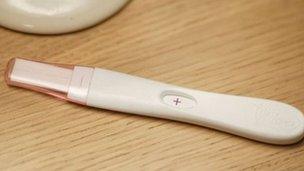Draft NI abortion guidelines to be published
- Published

Thousands of women travel to other parts of the UK each year for a termination
The Department of Health in Stormont has promised to publish draft advice on abortion for the NHS in Northern Ireland next week.
It was revealed during a High Court hearing in Belfast which had been due to decide whether the department had to publish the guidelines.
The attorney general said there was now no reason to proceed with the hearing.
Unlike the rest of the UK abortion is only allowed in very restricted circumstances in Northern Ireland.
The judicial review in the High Court was sought by the Family Planning Association (FPA) which has been campaigning for more than a decade for guidelines to be issued on the law on abortion.
The organisation received a letter from the office of the Health Minister Edwin Poots on Tuesday night which confirmed his decision to put proposals to the ministerial Executive in Belfast by 7 March.
He will submit a paper seeking approval to consult on a version of the guidance on termination of pregnancy.
'Clear pathways'
Outside court Audrey Simpson, chief executive of the FPA in Northern Ireland, called for guidance to be issued urgently, and said it was unfortunate it had to resort to legal action.
In a statement issued through her solicitors she said: "The action now promised by the department is something that should have happened many years ago.
"It's essential that the guidance should contain clear pathways for referrals for women and directions for aftercare services which is essentially what these proceedings were all about."
After previous legal action by the charity, the Department of Health in Stormont issued a 20-page document in 2009 containing guidance for health professionals on the termination of pregnancy in Northern Ireland.
It was withdrawn the following year after a successful legal challenge by anti-abortion campaigners led to a ruling that sections on counselling and conscientious objection should be rewritten.
Meanwhile, two Stormont assembly members are attempting to change the law to make it illegal to perform an abortion outside the NHS. It follows the opening of the private Marie Stopes International clinic in Belfast last year.
The DUP's Paul Givan, who chairs the justice committee, and the SDLP's Alban Maginness have tabled a joint amendment to the Criminal Justice Bill.
Abortion remains a sensitive issue everywhere, but is significantly more controversial in Northern Ireland. The opening of a Marie Stopes clinic led to demonstrations and scrutiny by a committee in the Northern Ireland Assembly.
For that reason it is quite possible that any guidance could face further legal challenges.
Speaking before the department's announcement, the Society for the Protection of the Unborn Child (Spuc) said in a statement: "By taking this legal action the FPA has demonstrated a growing frustration at its own lack of success in winning support for its agenda. Despite its efforts abortion in Northern Ireland remains a criminal offence.
"In trying to force the Department of Health to publish guidelines the FPA is actually attempting to medicalise the issue of abortion. The law, however, is perfectly clear and requires no guidance.
"Besides, any guidance which accurately reflected the law would not be acceptable to the FPA because it refuses to recognise the limitations within the current law. "
The Royal College of Obstetricians and Gynaecologists said its members were working from the earlier draft guidelines, described by government officials as having "no status".
The college said it hoped the judicial review "will lead to more clarity for professionals and better care for women residing in this part of the United Kingdom".
Republic of Ireland
There are some parallels between the legal battle in Northern Ireland and the debate in the Republic of Ireland, where abortion is even more restricted and is only permitted if there is a "real and substantial" risk to the woman's life.
The European Court of Human Rights said in a 2010 judgement that there were no clear criteria in the Irish Republic to apply to the case of any individual woman. Like the UK, the Irish Republic is signed up to the European Convention on Human Rights.
The death of Savita Halappanavar in a hospital in Galway in October last year hit the headlines around the world and reignited the debate. Her family said she asked for a termination when she began miscarrying but was refused, a decision they argued led to her death several days later.
An inquest into the death of the 31-year-old dentist is due to be held in April.
After taking advice from an expert panel the Irish government has said it is drafting legislation to address the European ruling and expects to be in a position to publish that in the next few months.
- Published27 February 2013
- Published19 February 2013
- Published4 February 2013